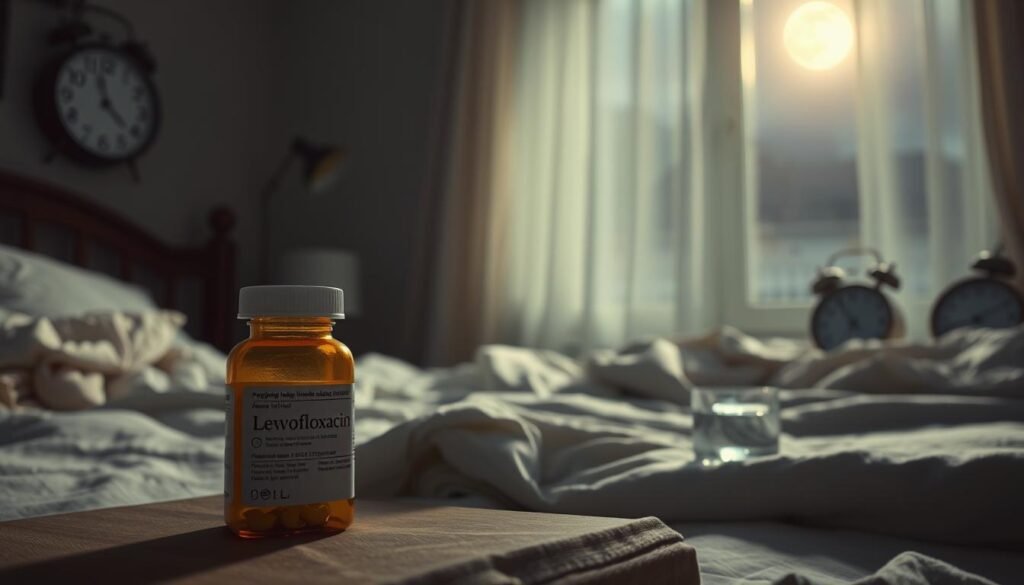Did you know about 15% of people taking levofloxacin report insomnia as a major side effect? This antibiotic is used to fight various infections but may hurt your sleep. Many taking it not only battle their health problem but also sleep issues which impact their daily life.
This article looks into how levofloxacin and insomnia are connected. We’ll see how side effects from the antibiotic can mess with sleeping well.
Key Takeaways
- Levofloxacin is linked to a notable incidence of insomnia reported by nearly 15% of patients.
- Understanding the relationship between levofloxacin and sleep quality is crucial for those affected.
- Insomnia can lead to significant daily life challenges beyond the primary health issue.
- It’s essential to recognize the broader implications of antibiotic side effects, including sleep disturbances.
- Patients should be aware of the symptoms of sleep disruptions related to levofloxacin use.
Understanding Levofloxacin and Its Uses
Levofloxacin is a key medication in the fluoroquinolone antibiotics group. It fights various bacterial infections. This includes pneumonia, urinary infections, chronic bronchitis, and skin issues. It kills harmful bacteria by stopping their DNA from replicating.
The drug comes in different forms like oral tablets, IV solutions, and eye drops. Oral tablets come in 250 mg, 500 mg, and 750 mg strengths. The right dose depends on the infection’s severity and factors like age and weight.
Taking levofloxacin might lead to side effects such as nausea, dizziness, and headaches. Sometimes, severe reactions like CNS issues and allergies can occur. Patients should know these risks and get help if bad reactions appear.
It’s crucial to finish all the levofloxacin your doctor prescribes. Stopping early can cause antibiotic resistance. Inform your doctor about any other drugs you take to avoid harmful interactions.
Some adults may experience neuropsychiatric issues like insomnia and anxiety while on levofloxacin. Being aware of these side effects helps manage them better. For more details on levofloxacin’s psychological effects, check out this research.
Levofloxacin Insomnia: Symptoms and Effects
Levofloxacin is a fluoroquinolone antibiotic often linked to insomnia. Many report troubles with falling or staying asleep during treatment. It’s essential to realize how these sleep issues can hurt our well-being.
Common Symptoms of Levofloxacin-Induced Insomnia
This type of insomnia comes with various troubling signs. Key symptoms include:
- Anxiety – Starting levofloxacin can raise anxiety levels, which makes sleeping hard.
- Restlessness – Feeling uneasy often keeps people awake. This makes it tough to relax and sleep.
- Irritability – Increased irritability can make sleep problems worse. It affects mood and daily life.
Examples of Sleep Disturbances Caused by Levofloxacin
There are notable cases of sleep issues from levofloxacin. Documented examples include:
- Young adults with acute anxiety and insomnia got better after stopping the medication.
- Cases of tactile hallucinations and acute anxiety highlight severe side effects.
- Some have faced acute psychosis, showing the serious risks of levofloxacin.
These instances underline the need for caution with Levofloxacin. Monitoring for insomnia and other effects is key during treatment.

| Symptom | Description | Potential Outcomes |
|---|---|---|
| Anxiety | Heightened levels of anxiety leading to sleep disruption. | Increased difficulty falling or staying asleep. |
| Restlessness | Feelings of unease that prevent relaxation. | Inability to achieve restful sleep. |
| Irritability | Decline in mood contributing to sleep struggles. | Impact on daily activities and interactions. |
| Hallucinations | Experiences of tactile hallucinations reported by some users. | Severe anxiety and potential discontinuation of medication. |
| Psychosis | Documented cases of acute psychosis in some patients. | Emergency interventions may be required. |
Antibiotic Side Effects and their Impact on Sleep
Antibiotics are crucial in fighting infections. However, they can have side effects that impact sleep. The FDA has noted a lot of insomnia cases tied to certain antibiotics. These mainly include fluoroquinolones like Levaquin, Cipro, and Avelox.
Between 2015 and 2016, the FDA reported numerous insomnia cases. There were 1,811 linked to Levaquin and 1,252 for Cipro. Avelox had 279 reports in that same timeframe.
Fluoroquinolones have a unique link to Medication-Induced Sleeplessness among antibiotics. The FDA has listed 87 drugs that could cause insomnia, with fluoroquinolones being a main concern. These drugs can interfere with the brain, disrupting sleep. They can also cause stomach problems, dizziness, and other neurological issues. All of these make sleeping harder.
In August 2013, the FDA warned about a side effect called peripheral neuropathy in fluoroquinolones. This could lead to serious neurological problems. There’s worry about fluoroquinolones causing mental health issues. Cases of anxiety and insomnia, especially in younger people, have appeared. Luckily, these effects often stop once the medication is stopped.
The concerns around Fluoroquinolone Risks go further. Research found a link between starting fluoroquinolones and hospital visits for suicide risks. More studies suggest being extra careful when starting fluoroquinolone treatments. It’s important to think about the pros and cons of these drugs.
| Antibiotic | Reports of Insomnia | FDA Warning Date |
|---|---|---|
| Levaquin | 1,811 | August 2013 |
| Cipro | 1,252 | August 2013 |
| Avelox | 279 | August 2013 |
The rising evidence of Antibiotic Side Effects on sleep is clear. Doctors need to consider each patient’s risks and look for safer options. As more is understood, the importance of keeping sleep healthy while treating infections is getting more attention.
Fluoroquinolone Adverse Reactions: A Closer Look
Fluoroquinolones, like levofloxacin, are antibiotics used for different infections. Their use has gone up over time. This increase is linked with more reports of side effects, especially on the mind and emotions. Problems like anxiety, restlessness, and psychosis can affect how well you sleep.
Neuropsychiatric Side Effects of Fluoroquinolones
A study with 631 veterans showed a link between fluoroquinolones and mental health side effects. About 3.7% had issues like psychosis or delirium after taking these drugs. This makes it crucial to think carefully about using Levofloxacin because of these serious side effects.
Patient Cases Highlighting Sleep Issues
There are case reports linking fluoroquinolone use with sleeping problems. One case involved a young diabetic patient struggling with painful nerve damage and insomnia after taking levofloxacin. These stories remind us to watch and manage sleep problems during treatment. Doctors need to consider these effects to find the best treatment plan. For more information, check out studies here and here.

Levofloxacin Safety Concerns
Levofloxacin is an antibiotic often prescribed but it has serious safety issues. About 46.9% of patients taking these types of drugs face psychiatric problems. Meanwhile, 40.7% may deal with nerve issues. Less than 10% have troubles related to both.
This means doctors need to be very careful when prescribing it. Especially to those who are most at risk.
The FDA has warned about harms like tendinitis and tendon tears from levofloxacin. This is especially risky for those over 60 or with other health issues. Studies show it can weaken tendons, which is bad for surgery patients.
Severe allergies can happen right after taking levofloxacin. It can also cause seizures or serious psychiatric effects. Concerns about suicidal thoughts add to the worry. This underscores the importance of drug safety awareness.
Diabetics or anyone with sugar issues could see big swings in their levels. Levofloxacin also makes you more sensitive to the sun. These risks show why choosing this drug requires caution.
Knowing the dangers can stop worse problems later. Doctors should keep up with the latest on levofloxacin risks. Ongoing studies are crucial for understanding its long-term effects. To learn more about related psychiatric risks, click here.

Medication-Induced Sleeplessness and Its Implications
Medication-induced sleeplessness poses challenges, especially with antibiotics for bacterial infections. Implications of insomnia go beyond poor sleep, affecting health and wellness. Side effects include fatigue, impaired thinking, and mood changes.
Fluoroquinolones like levofloxacin cause antibiotic sleep issues, such as insomnia and anxiety. These side effects are common in older adults but can also affect the young. Stopping levofloxacin often reduces these symptoms, showing the importance of knowing which meds can worsen health.
Sleep problems from antibiotics are a growing concern. Up to 17% of those on fluoroquinolones experience stomach issues, complicating their care. The impact of various drugs, especially on brain health, needs more study, especially for tough conditions like drug-resistant TB.
In choosing antibiotic treatments, doctors must watch for insomnia signs. Not doing so could lead to serious mental health issues. Working together, medical experts can better manage medication-induced sleeplessness and its effects.
Knowing the side effects of levofloxacin improves patient care and awareness. For detailed info, see additional insights on levofloxacin insomnia and related problems.
Insomnia Management Strategies while on Levofloxacin
Managing insomnia during levofloxacin treatment needs good strategies. These can help improve sleep and well-being. If levofloxacin causes sleep problems, there are ways to help.
Practical Tips for Managing Sleep Disturbances
Effective Insomnia Management Strategies can help a lot. Here are some useful tips:
- Have a regular bedtime routine to tell your body it’s sleep time.
- Stay away from caffeine and stimulants before sleep.
- Make sure your bedroom is dark, quiet, and cool for better sleep.
- Cut down on screen time before bed to avoid blue light.
- Try deep breathing or meditation to calm yourself before bed.
When to Consult Your Healthcare Provider
Knowing when to Consult Healthcare Provider is key. If insomnia doesn’t get better or sleep worsens, get medical advice. Your provider might adjust the levofloxacin or suggest other treatments. Taking action early ensures sleep issues don’t hurt your recovery.
Conclusion
Levofloxacin is a strong antibiotic used to fight many infections. However, it has a downside. This downside is a high chance of causing insomnia. Many patients have reported sleep issues and other mental side effects. This raises concerns about how it affects sleep quality.
Studies show that 3% to 17% of people taking fluoroquinolone antibiotics face mild stomach problems and severe anxiety. These side effects present a real risk to patient health and happiness.
In cases where stopping levofloxacin led to the end of psychiatric symptoms, it’s clear we need to be watchful. We must keep a close eye on patients, especially young adults without previous brain disorders. This is crucial to stop bad reactions from high doses. This applies especially when dealing with tough cases like multi-drug-resistant tuberculosis.
Overall, the sleep problems and mental health issues linked to levofloxacin call for more study and teamwork in the medical field. By talking openly and keeping a careful watch, patients can have better sleep and health. This highlights the need to know and tackle these risks with care.